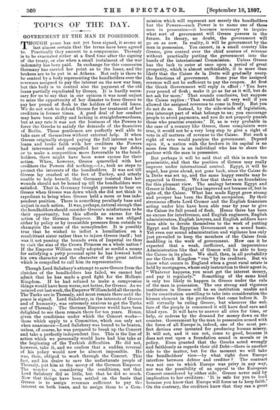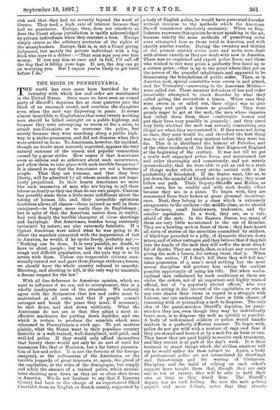TOPICS OF THE DAY.
■ 411,.■ GOVERNMENT BY THE MAN IN POSSESSION.
THOUGH peace has not yet been signed, it seems at last almost certain that the terms have been agreed to. Practically they amount to a compromise. Thessaly is to be evacuated either at a fixed time after the signing of the treaty, or else when a small instalment of the war indemnity has been paid. In exchange for this concession Germany has carried her point as to the loans, and the brokers are to be put in at Athens. Not only is there to be control by a body representing the bondholders over the revenues assigned to pay the interest on the new war loan, but this body is to control also the payment of the old loans partially repudiated by Greece. It is hardly neces- sary for us to say that in our opinion it was most unjust to seize the opportunity of her disaster to force Greece to pay her pound of flesh to the holders of the old loans. We do not wish to defend Greece for her treatment of her creditors in former times. A good deal of her conduct may have been shifty and lacking in straightforwardness, but at any rate it was not the business of the Powers to force the Greeks to satisfy the demands of the financiers of Berlin. Those gentlemen are perfectly well able to take care of themselves without external help. If when Greece originally stopped paying the full interest on her loans and broke faith with her creditors the Powers had intervened and compelled her to pay her debts or to make a composition more favourable to the bond- holders, there might have been some excuse for their action. When, however, Greece quarrelled with her creditors the Powers did nothing,—i.e., took no steps to protect the interests of the bondholders. It was not till Greece lay crushed at the feet of Turkey, and utterly unable to help herself, that Germany insisted that her wounds should not be bound up till the bondholders were satisfied. That is, Germany brought pressure to bear on Greece when Greece was down which she did not think it expedient to bring when Greece held a more or less inde- pendent position. There is something peculiarly base and unjust in such action. It was, perhaps, natural enough that the bondholders should consider Greece's misfortunes to be their opportunity, but this affords no excuse for the action of the German Emperor. He was not obliged either by policy or by irresistible pressure from outside to champion the cause of the moneylender. It is possibly true that he wished to inflict a humiliation on a recalcitrant sister rather than to injure Greece itself ; but was it not passing the bounds even of Imperial ire thus to visit the sins of the Crown Princess on a whole nation ? If the Emperor William really adopted so sordid a means for satisfying a petty personal spite he has lowered both his own character and the character of the great nation which is compelled to call him its representative.
Though Lord Salisbury's attempt to save Greece from the 431utches of the bondholders has failed, we cannot but admit that he has made a good fight for the Hellenic Kingdom. If he had refused to make a compromise things would have been worse, not better, for Greece. As we pointed out last week, the Emperor William held all the cards. The Turks are in Thessaly, and must remain there until the peace is signed. Lord Salisbury, in the interests of Greece and of humanity, was extremely anxious to get the Turks out of Thessaly. The German Emperor would have been delighted to see them remain there for ten years. Hence, given the conditions under which the Concert works— those which apply to a Committee, which can only act when unanimous—Lord Salisbury was bound to be beaten, unless, of course, he was prepared to break up the Concert and take a perfectly independent line. This is the line of action which we personally would have had him take at the beginning of the Turkish difficulties. He did not, however, take it, and we confess that a sudden reversal of his policy would now be almost impossible. He was, then, obliged to work through the Concert. This fact, and his desire to save the unfortunate people of Thessaly, put him at the mercy of the German Emperor. The wonder is, considering the conditions, not that Lord Salisbury did so little, but that he did so much. Now that things have been settled on the basis that Greece is to assign revenues sufficient to pay the interest on both loans, and to assign them to a Com- mission which will represent not merely the bondholders but the Powers—each Power is to name one of these men in possession—it becomes necessary to inquire what sort of government will Greece possess in the future. In theory, no doubt, the government will go on as now. In reality, it will be government by the man in possession. You cannot, in a small country like Greece, give control over the chief sources of revenue without practically putting the government into the hands of the international Commission. Unless Greece has the luck to enter at once upon a period of great prosperity, which is almost unthinkable, it is more than likely that the Caisse de la Dette will gradually usurp the functions of government. Some year the assigned revenue will not be sufficient to pay the coupon. At first the Greek Government will reply in effect : You have your pound of flesh ; make it go as far as it will, but de not ask for more.' That sounds conclusive, but suppose the Caisse replies : 'That would be all very well if you allowed the assigned revenues to come in freely. But you do not do so. Instead, by the side-winds of legislation; you intercept part of what belongs to us ; you encourage people to avoid payments, and you do not properly punish those who practise evasions.' If, as is very probable in the case of a country like Greece, these complaints were true, it would not be a very long step to give a right of veto in all matters of revenue to the Caisse. But such a right of veto would paralyse the government. Depend upon it, a nation with the brokers in its capital is no more free than is an individual who has to share the parlour with the man in possession.
But perhaps it will be said that all this is much too. pessimistic, and that the position of Greece may really improve under international control. Egypt, it will be urged, has gone ahead, not gone back, since the Caisse de la. Dette was set up, and the same happy results may be expected in Greece. We fear that there is no foundation for this pleasant view. The analogy between Egypt and Greece is false. Egypt has improved not because of, but in spite of, the Caisse. What has made Egypt grow strong and prosper has been the English occupation. By their strenuous efforts Lord Cromer and the English financiers acting under him have been able year by year to give the Caisse its full pound of flesh. Hence there has been no excuse for interference, and English engineers, English administrators, English lawyers, and English soldiers have been able to devote themselves to the work of putting Egypt and the Egyptian Government on a sound basis. Yet even our sound administration and vigilance has only just prevailed to keep the members of the Caisse from meddling in the work of government. How can it be expected that a weak, inefficient, and impecunious Administration like that of Greece will be able to keep the Caisse in its place. We shall, then, in all probability see the Greek Kingdom " run " by its creditors. But we know what occurs in England when a great rural estate is held by mortgagees, whose only instruction to their agent is, "Whatever happens, you must get the interest money, and pay it regularly." Something of the same kind is only too likely to happen in Greece under the rule of the man in possession. The one strong and vigorous institution in Greece will be an institution unable and by its constitution unwilling to take into consideration the human element in the problems that come before it. It will virtually be ruling Greece, but wherever the wel- fare of the people is concerned it will have deaf ears and blind eyes. It will have to answer all cries for time, or help, or redress by the demand for money down on the counter. Government by the man in possession armed with the force of all Europe is, indeed, one of the most per- fect devices ever invented for producing human misery. It will not, and it can not, come to good, because it does not rest upon a foundation sound in morals or in policy. Even granted that the Greeks acted wrongly and faithlessly as regards their old Debt—there is another side to the matter, but for the moment we will take the bondholders' view—by what right does Europe interfere between debtor and creditor ? The contract was not one to which Europe was privy in any way, nor was the possibility of an appeal to the European Concert considered by either side. Greece never said by implication to her creditors : It is safe for you to lend because you know that Europe will force us to keep faith! On the contrary, the creditors knew that they ran a great risk and that they had no security beyond the word of Greece. They took a high rate of interest because they had no guarantee. Europe, then, does not interfere as does the Court whose jurisdiction is tacitly acknowledged by private individuals when they contract a loan. Europe simply enters as the arbitrary protector of the rights of the moneylenders. Europe, that is, is not a Court giving judgment, but merely the private individual with a big stick who says to a debtor : —' That man says you owe him money. If you pay him at once and in full, I'll call off the dog that is biting your legs. If not, the dog can go on worrying you. But I expect you're likely to get tired before I do.'



































 Previous page
Previous page